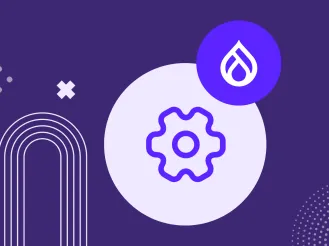The Benefits of Migrating to an Open-Source CMS Like Drupal
Sitecore is in the midst of developing a comprehensive new platform and rewriting its entire tech stack. And unfortunately, it looks like adopting the new platform won’t be automatic or easy. Current users will need to undergo a site rebuild and full migration.
That means if you’re a marketing or IT leader currently using Sitecore, now’s the time to reevaluate your options. After all, you have a daunting task ahead of you no matter what. Since adopting the new Sitecore suite will be just as involved as switching to an entirely new system, you should ask yourself if the system you’re migrating to is truly designed to meet your needs.
Specifically, you’d be wise to evaluate the benefits of an open-source CMS like Drupal. With a proprietary system like Sitecore (or any other), you’re locked into the options, features, and roadmap they determine. But an open-source CMS puts more control in your hands — all while offering limitless flexibility, adaptability, and scalability to reach your evolving business goals.
Here’s a look at the advantages of choosing Drupal — and an overview of the technical details you’ll need to stay on top of if you decide to make the leap.
Marketing Leaders: The Strategic Advantages of Migrating to Drupal
If you’ve always used a proprietary CMS, creating a custom-built website from the ground up might feel overwhelming. Even when using the leading open source enterprise alternative. And yes, it is a different process. You should enter into it with realistic expectations regarding how long it will take and what it will require.
But it’s also crucial to understand the long-term benefits you stand to gain. Switching to Drupal will enable you to revisit everything from your design to your content strategy, all while creating a solution that looks and functions just the way you want it to.
Open Source Flexibility
“What-you-see-is-what-you-get” sounds attractive until you realize it also works the other way. When you can’t get what you don’t see — meaning you can’t add new features or customization options — you’re stuck.
In other words, though proprietary CMSs are sometimes easier to use out of the box, and you can customize them to some extent, the options are inherently limited.
By contrast, an open-source CMS like Drupal provides an extensive range of modules and themes to tailor your website and digital experiences to your specific business objectives. This flexibility enables you to create unique, personalized, and engaging content that resonates with your target audience and ultimately drives better outcomes. There is also a global community of developers experienced in extending the platform not only professionally but on a volunteer basis.
No Licensing Fees
Drupal is highly configurable, which can make it complex. Therefore you’ll benefit from hiring an agency partner to design your new website. This might initially make you think it’s more costly to go custom than to purchase a proprietary solution. However, Drupal is free to use on an ongoing basis — no hefty licensing fees to factor in.
The open-source nature of Drupal attracts a vibrant community of developers and other users who contribute to its continuous improvement. They update documentation, add features, fix bugs, and release security patches available to anyone using Drupal without needing expensive subscriptions or maintenance contracts.
For these reasons, the long-term cost could be far less than you think.
Scalability and Performance
The digital solution you build today may not be the solution your organization needs tomorrow. With Drupal, that’s ok — it can scale and grow as quickly as you do.
Drupal can easily handle high traffic volumes, large content repositories, and complex digital requirements. Its robust architecture and caching mechanisms ensure the website remains responsive and performs well, enhancing your overall user experience and preventing potential revenue loss due to site downtime or slow loading times.
Extensibility and Interoperability
You undoubtedly rely on numerous tools and systems to execute your strategies effectively. Thankfully, Drupal makes it possible to connect them all, enabling data to flow back and forth seamlessly and allowing your marketing team to take advantage of smart automation options.
Not only is there an extensive ecosystem of existing APIs, but there’s also the option to create custom integrations when needed.
Community Support
One of the best things about Drupal is its worldwide community of users, with over 1,000,000 developers, designers, trainers, strategists, coordinators, editors, and sponsors. Within this community is a core group of 1,500 members, who actively share knowledge and provide support through forums, documentation, and user groups. Having access to this community means you can tap into a vast pool of expertise, best practices, and innovative ideas at all times.
The Drupal community can help you troubleshoot issues, optimize performance, stay up-to-date with the latest trends, and constantly level up your site.
IT Leaders: Technical Considerations for a Smooth Migration to Drupal
Whether you’re staying with a proprietary platform like Sitecore or shifting to an open-source CMS like Drupal, preparing for a CMS migration requires smart, thorough planning.
This checklist will help you stay on top of every salient detail.
APIs and Export Options
Review current platform infrastructure and assess the availability of APIs to export data via CSV, XML, JSON, or direct database connection. Make sure you understand how you’ll need to structure your data and content to map it over accurately and protect its integrity.
Content
Chart out the path for each type of content. In conjunction with marketing leaders, determine the content you’ll keep and the content you’ll need to rewrite or create from scratch.
Managed Hosting
Unlike proprietary systems that often limit hosting the CMS on a per server basis which significantly limits your hosting options and can make it impossible to scale on demand , Drupal can be hosted anywhere under any configuration including containerized managed hosting. This means you are free to select a managed hosting provider that will deliver the level of service you require. The good news is that you may be able to access more capacity even temporarily during traffic spikes at a lower cost than the amount built into a proprietary contract.
Security
Although open-source CMSs like Drupal may initially appear less secure, in reality, they’re often more secure than their closed-source counterparts. Why? With a closed- source CMS, the only people reviewing the code are those who own it. But with an open- source CMS, the code is heavily scrutinized by developers around the world. As a result, bugs and other security issues are fixed promptly.
So don’t be alarmed if you see a steady flow of security patches come through — it means the Drupal Security Team is doing its job.
Software Stack Compatibility
If you’re switching to an open-source CMS like Drupal, you’ll be pleasantly surprised to discover the software options, programs, and platforms available to you. Don’t worry if you don’t have the internal skillset to validate every program you want to use. A good agency partner can help you assess what’s possible when building out your tech stack.
And remember: Migrating to a new CMS — whether to a new version of Sitecore or an entirely new solution like Drupal — is a significant change. To succeed, you need your entire team’s support and participation.
So be sure to communicate openly and transparently about the reasons for the change and the benefits your organization stands to gain. Involve them in the decision-making process as much as possible. And empower them to adapt their current workflows to minimize service interruptions and other frustrations.
Position Your Organization for Long-Term Success: Make the Switch to Drupal
Sitecore's re-platform and the inevitable migration process present a prime opportunity for IT and marketing leaders to reconsider their CMS choice. Migrating to an open-source platform like Drupal delivers game-changing benefits such as greater control, flexibility, adaptability, scalability, and cost-effectiveness for your organization.
As you evaluate your CMS options, carefully consider a migration’s technical aspects and the strategic advantages an open-source solution provides. By embracing change thoughtfully, you can position your organization to not only survive the migration, but also thrive as a result of it.
When you’re ready to learn more about migrating from Sitecore or any other proprietary system, ImageX can help. Just reach out.







